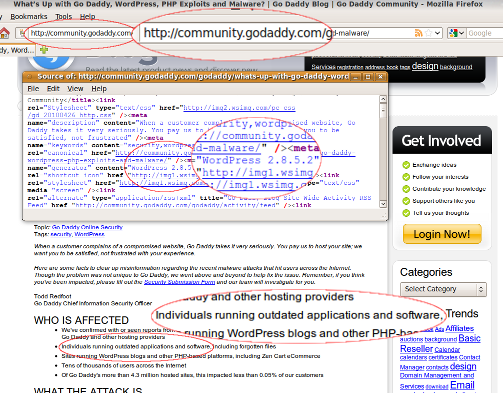Yesterday I blogged about the hacking situation with GoDaddy hosting and a customer service call I had with them concerning some evidence I had found. While it is true that as this has progressed GoDaddy has widened their scope in investigating what the underlying cause of these hacks are, initially they claimed that the issue was with their customers running outdated versions of WordPress. While being wrong about something like that is usually not that big of a deal, in this particular instance it proved to be beyond irksome, since a large portion of their customer base were told that it was their own fault that their sites got hacked (even in cases where the customer was up to date), and that GoDaddy was in no way to blame:
WordPress is a-ok. Go Daddy is rock solid. Neither were ‘hacked,’ as some have speculated.
After an extensive investigation, we can report there was a small group of customers negatively impacted. What happened? Those users had outdated versions of the popular blogging software, set up in a particular way. – Alicia from GoDaddy
From what I have read around the web customers were being told that it was not GoDaddy’s responsibility to fix the sites, that they only offered “limited support” in situations like this, leaving people with only the option of restoring from a backup (which would often not help even in outdated WordPress hack situations, since hacks can go undetected for months) or hiring outside help to clean things up.
You can see on the support page they have set up, What’s Up with Go Daddy, WordPress, PHP Exploits and Malware? that they still claim that outdated scripts are part of the problem. Going to that page and viewing the source reveals something almost unbelievable:

(click to enlarge)
That’s right, in a classic “do as I say, not as I do” twist it seems that GoDaddy is in fact running an older version of WordPress (WordPress MU, based on the version number, which has the same security holes as regular WordPress) for their community blog that they are using to tell people to upgrade their WordPress versions.
To be fair, simply having an older version of WordPress does not mean that it is automatically insecure… the security fixes in the more recent versions may be minor and the known vulnerabilities might have been manually patched. I can’t know without actually digging deeper and looking if in fact the installation was vulnerable.
Then again… neither can GoDaddy in the case of their customers.
 I work from my house and keep odd hours, so when a family member needs some sort of worker let into their house during the day I am often asked if I am available to do it. I don’t mind, we all live fairly close together, and it’s not that much of a hassle on most days. Tonight my mom called and asked me if I could let someone in to her place tomorrow to look at her tub, because it’s clogged. She’s tried Drano twice, poured boiling hot water in it, and even tried plunging it, all to no avail. I told her it would be no problem for me to let someone in.
I work from my house and keep odd hours, so when a family member needs some sort of worker let into their house during the day I am often asked if I am available to do it. I don’t mind, we all live fairly close together, and it’s not that much of a hassle on most days. Tonight my mom called and asked me if I could let someone in to her place tomorrow to look at her tub, because it’s clogged. She’s tried Drano twice, poured boiling hot water in it, and even tried plunging it, all to no avail. I told her it would be no problem for me to let someone in.
